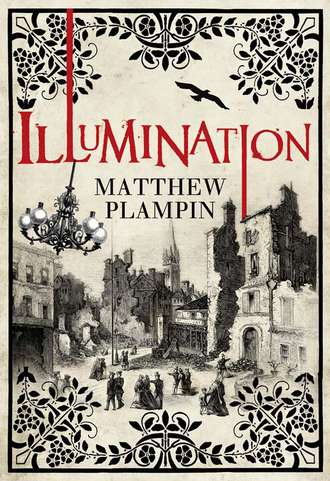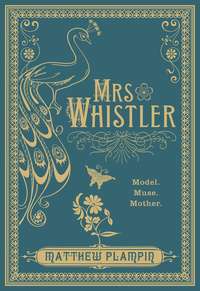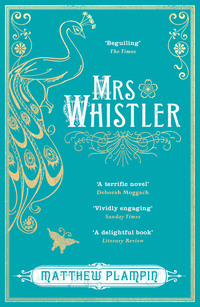
Полная версия
Illumination
‘Look at these fellows,’ sneered Inglis, ‘bright and clean in all the bravery of just-served-out clothing.’
Leaning from his window, he hailed a group of militia and asked a question. They answered him with vehement energy; even Clem could tell that things were not going well for France.
Elizabeth held out her hand for the notebook. ‘Clement, if you please.’
‘What’s happening?’
‘It would seem that a French division attacked a column of Prussians, but then broke apart when their fire was returned,’ his mother told him. ‘They are now fighting simply to retain their original position.’
She began to write and was soon absorbed. The cannons picked up beyond the wall, eliciting an anxious murmur from the crowds outside and a whinny from the cab’s horse, yet she barely reacted. What have you done, Clem wanted to shout at her; what have you let us in for, merely to boost your damned career? Last night had been a marvellous adventure, one to cherish, but this – the artillery, the bawling militia, the hordes of rampaging Prussians – this was really getting to be too much. The carriage had grown intolerably hot and cramped. He noticed that he was trembling; disposing of his cigarette, he placed his palms firmly on his kneecaps and splayed his fingers as wide as they would go. This brought no steadiness.
Inglis sat back from the window. ‘Dear me,’ he chortled, ‘not a very promising start! This’ll put a crack in the Parisians’ rather exalted sense of themselves.’ He nodded at his photographer. ‘No offence, Monsieur Besson.’
Besson wasn’t listening. ‘Mr Inglis,’ he said in accented English, putting away his sketch, ‘I have a notion. I shall head up to the circular railway. I can get a good view from there – of Montrouge, of the plateau. A fine picture could be taken in this light.’
Spying Elizabeth’s industry, Inglis had dug out a pencil of his own and was scribbling in the corner of an old theatre programme. ‘Capital, capital,’ he said. ‘Just be sure that you’re at that church on the rue du Château within the hour, d’you hear? I know what you’re like, Besson, wandering off wherever your fancy takes you.’
Dislike flickered across the photographer’s face as he slid a case from the luggage rack. He said nothing.
Clem saw a chance for escape. ‘I’ll come along to assist you, Monsieur Besson. I’ve put up a few photography tents in my time. I – I could use the air, to be quite honest.’
Elizabeth made no comment; she turned a page, touching the tip of her pencil against her tongue.
Besson eyed him with a marked lack of enthusiasm, but couldn’t think of a reason to refuse. ‘Very well,’ he said.
The Paris circular railway ran along a steep-sided embankment a short distance from the city wall. Besson’s pace didn’t change as he went from the street to the slope; Clem, despite having only been given the doctor’s bag to carry, soon fell far behind. When he reached the top Besson had already assembled his tent poles and was shaking free the canvas cover. Clem panted across the train tracks towards him.
‘So there it is,’ he gasped, setting the doctor’s bag down next to the camera, ‘a deuced battle.’
They were up above the rooftops, perched on the very edge of Paris. Directly in front of them were the fortifications, heavy ramparts of earth and stone crowded with National Guard. Just outside the city gates lay a village, Montrouge Clem assumed, its lanes blocked by stationary carts. Beyond, perhaps a mile away, was the chain of forts on which the defence of the capital depended. He could see three of them, brownish mounds heaped upon the smooth farmland like shovelfuls of clay. Past this everything grew indistinct, enveloped in a haze of sunlight and vapour; but off to the west a low plateau was boiling with dust, threads of black smoke trailing from the village atop it. Around the buildings was the shifting grey-blue stain of a large body of men, moving at speed as they obeyed some unknown command. Rifles crackled; artillery hammered out a lopsided beat. It was easier to take than Clem had anticipated. The alarm he’d felt in the carriage was allayed, more or less; he even felt an odd invigoration. He lit a cigarette and watched.
Beside him, Besson was hard at work. The Frenchman’s suit rustled as he moved. It was made from some kind of fire-retardant material, with scorch-marks on the jacket cuffs and waistcoat – curious garb for a photographer.
‘Tell me, Monsieur,’ Clem asked, ‘what particular composition do you have in mind? The action seems a touch too distant to me.’
Besson just waved vaguely at the landscape before taking a mallet and tent pegs from his canvas sack. There was something hurried about his actions; this was a man eager to dispense with a chore.
‘How many images is Mr Inglis planning to include?’
The photographer crouched to knock in a peg. ‘Who can say what that fool might want?’
Clem smiled. ‘He’s an old acquaintance of my mother’s, you know.’
‘They are opponents. It is plain. He plans to keep her close to make sure she does not get ahead of him.’
The smile faded. ‘Yes, well, you may be onto something there …’
‘Both are here to feast on our defeat, our misery.’ Besson moved from one corner of the tent to another. He sounded more sad than angry. ‘Vultures on the carcass of France.’
‘I suppose that I am a vulture too then, Monsieur Besson?’
‘I don’t know what you are,’ Besson said. He drove the final peg all the way into the ground with a single blow from his mallet. ‘What are you?’
Clem raised his hands, indicating his harmlessness. ‘Merely a brother, Monsieur, motivated by concern for his sister. She lives in Montmartre – that’s why we came. Why I came, at least. And I thought I’d be long gone by now, believe me.’ A shell sparked in the distance, the sound of the blast reaching them a second later. ‘I certainly never imagined that I’d be seeing anything like this.’
The photographer walked around his tent: basic enough, but it would serve. He took in the view for a few moments, then he set up a tripod, attached his Dallmeyer and slotted in a focusing screen.
‘She is not with you, though, this sister,’ he said, ducking under the hood to operate the sliding-box mechanism. ‘Could you not find her?’
‘Oh, we found her all right, tucked in the seediest corner of the seediest dive – and having a bloody whale of a time.’ Clem’s laugh rang hollow. ‘We thought that she might have need of us, Monsieur, but it swiftly transpired that she very much did not. There’s a man involved, you understand. Some red from the provinces named Jean-Jacques Allix.’
The hood was whipped back. Besson looked at him with new interest. ‘I know of him. I have heard him speak.’ He made a connection. ‘Your sister is his Anglaise. The painter.’
‘That she is.’ Clem drew on his cigarette. ‘I suppose she must cut a pretty distinctive figure.’
‘Plein-air painters are becoming common in Montmartre. It is a cheap place to live.’ Besson worked a leather cap over the camera lens and picked up the doctor’s bag. The faintest patch of colour had appeared on his cheek. ‘But a woman, and a foreigner as well – this is not so common.’
‘Have you actually met Hannah, Monsieur Besson? Are you two acquainted?’
‘Yes – no.’ The photographer started for the tent, avoiding Clem’s eye as he passed. ‘We have spoken on a couple of occasions. Only pleasantries. I see her, though, in the lanes and gardens. At her easel.’
Besson was talking quickly, as if attempting to deny something. Clem hid his amusement. It could safely be asserted that this photographer numbered among his sister’s Parisian admirers; the poor cove couldn’t even begin to disguise it. He turned to the tent. Besson was kneeling within, frowning slightly as he mixed his solutions. Keen to advance the conversation, sensing that he’d given himself away, he asked about Clem and Elizabeth’s original plan.
‘You meant to leave today, did you not, but have been trapped in with us.’ The Frenchman slid a glass negative plate from its case. ‘Why did you arrive in Paris so late, Mr Pardy? Surely you could have come for your sister a week ago. Why take such a risk?’
‘We wouldn’t have come at all had we not been summoned. Han is not overly fond of surprise visits.’
Clem paused; he tapped off a half-inch of ash and gave Besson the whole sad story, from the arrival of the letter in St John’s Wood to their restitution in the Grand Hotel that morning. He’d never been one for holding things back; and besides, he’d gained a definite impression that this fellow might be able to help. The photographer was pretty astute, that much was clear, despite his curtness. His perspective, as a resident of Montmartre who knew a little of Hannah’s life, could be exactly what was required.
If any original observations occurred to Monsieur Besson, however, he kept them to himself. While Clem rambled on he set about preparing his negative plate, coating it with treacle-like collodion, dipping it in silver nitrate and transporting it carefully to the camera.
‘It is good that you are still here, Monsieur,’ he said when Clem had finished, as he pushed in the plate. ‘Your sister may have need of you yet.’
Clem remembered his minute-long exchange with Hannah the previous evening. ‘She would disagree with you there, old man,’ he replied with a rueful chuckle. ‘She would most certainly disagree.’
Besson said no more. Taking off the lens cap, he wordlessly counted down the five seconds needed for an exposure; then he replaced the cap, slid out the plate and retreated again to his tent.
A cry rose from the gates, down in front of their position. Between the houses and the fortifications, Clem could see a dozen or so French infantrymen being led back into the city. They were young, as was every regular soldier in Paris it seemed, and they were plainly under arrest, their hands bound and their faces raw and bloody. Some had placards around their necks; they were deserters, those who’d fled under fire, being returned for punishment. The crowd jeered and spat, throwing whatever bits of rubbish they could find. Clem dropped his cigarette into the dirt and scraped over it with his boot. The battle had been brought disconcertingly close.
Besson emerged from the tent with the dripping negative in his hand. The image captured on the glass was visible against the pale canvas of the tent-flap. It was a failure, the contrast too strong: black rooftops and fortifications in the foreground with little else but whiteness beyond. Besson flexed his wrist and spun the plate towards the railway line, where it shattered against an iron track. He unbuttoned his jacket and sat down heavily on the grass.
‘It is no use. I am no photographer.’
‘Come now,’ said Clem, trying to be consolatory, ‘you know the process well enough. And you have this fine camera.’
‘It is not mine. I borrowed it. I needed the money.’ Besson winced. ‘Foolish.’
‘But you’re an associate of the great Nadar, are you not? Surely that counts for something?’
‘Not with photographs. I let the idiot Inglis think this so that he would employ me. My association with Nadar is in a very different sphere.’ Besson pushed back his hat and with some pride said, ‘I am an aérostier, Monsieur. A member of the Société d’Aviation.’
Clem was dumbstruck. Why the devil hadn’t he realised this sooner? It was virtually bloody signposted. The brittle Monsieur Besson had a clear scientific leaning, yet was also practical in manner and rather weather-beaten: the exact type drawn to ballooning. That strange suit had obviously been made to withstand the mishaps commonly endured by the aeronautical gentleman. The sketch he’d been working on in the cab had been of a gas valve for a balloon.
And then there was his link with Nadar, who had once been quite a name in ballooning circles, almost as prominent as he was among photographers. An exhibition of his innovations at the Crystal Palace a few years ago had inspired in Clem a brief mania for all things air-bound; a bundle of designs for winged dirigibles was still stowed under his bed in St John’s Wood. At the peak of his accomplishments, however, Nadar had been forcibly and very publicly removed from the heavens. There had been an accident on the North Sea coast, with serious injuries – Madame Nadar had only just escaped with her life. Many had chosen to regard it as divine punishment for hubris; Nadar had gone back to his photographs like a man chastened.
‘I thought he’d given it up. You know, after the crash.’
‘He has recovered his nerve,’ Besson said. ‘Nadar considers the balloon, the French mastery of free ballooning, to be a valuable weapon against our enemy. More so, certainly, than the photograph.’ The aérostier turned towards the city. ‘He is airborne now. Right there, above the Buttes Montmartre.’
Clem followed Besson’s pointing finger. Suspended over Paris, over the golden domes and ancient spires and grand boulevards, was a single white sphere, so tiny that it hurt the eyes to pick it out. The basket beneath, the men inside, could not be seen. It looked like a moon that had been fished from the firmament and roped to the earth. Clem stared; he took off his hat. Merely thinking of what it might be like up there, floating alone in that boundless sky, left him dazzled with terror and elation.
‘That one is fixed, of course – for observation only,’ Besson told him, ‘but we have our plans.’
‘Such as what?’ Clem demanded. His mind teemed with visions of bombs being tossed from baskets into the depths of the Prussian positions; of crack troops being delivered straight into the enemy’s headquarters; of cavalry detachments strapped beneath balloons, their hooves dangling in the air. ‘Do tell, Monsieur Besson!’
The Frenchman’s mouth curved downwards, forming a sort of reluctant smile – the first indication that anything resembling a sense of humour might exist within him. ‘We will fly out letters, dispatches, orders to the armies in the provinces. We will bring France together. The Prussians will not silence us, Mr Pardy. We will get word to the world of what they are doing.’
Clem nodded, a little disappointed by this answer. ‘And will you pilot one of these craft yourself?’
‘I will not. We are going to launch a great many balloons, more than the Prussians can count – or chase. Several shops are being set up to make them. There is to be one close to the place Saint-Pierre, in fact, in an abandoned dancing school. That is why I am living there. I shall oversee the work. Train the men who are to fly.’
A balloon workshop in a Montmartre dancing school! It was like one of Clem’s own schemes brought to life. He held out a hand to help the aérostier back to his feet.
‘Monsieur Besson,’ he said, ‘this I really have to see.’
IV
The Café Géricault was on the rue des Acacias, a hundred yards from the place Saint-Pierre. Time was short – the march would be leaving for the boulevards at any moment – but Hannah could not ignore this. It was Lucien who’d directed her there. She’d encountered him in a bustling passage, quite by chance; clothing in disarray, missing his hat and one of his boots, he’d been so battered by drink that he appeared close to expiration. Having rejected her proposal that he join the march in the bluntest terms, he’d informed her that her twin brother had popped up again, not two streets away.
‘He’s with somebody, over in the Géricault,’ the painter had croaked. ‘One of Nadar’s men, I believe. Now please, Hannah dearest, could you possibly lend me five sous?’
The long room was so full that the bar itself was hidden from sight. Between the café’s peeling walls the noise of the lanes was concentrated, amplified fourfold; the mostly male clientele were drinking wine, coffee and spirits, and smoking as if the city’s tobacco reserves faced imminent confiscation. Clement wasn’t difficult to locate. Off to the left, against one of the frosted front windows, he stood out from the locals like a dusty brown beagle in a pack of whippets. There it was – Hannah’s mother and brother were still in Paris. They had been caught in the Prussian encirclement, as Jean-Jacques had said back in the shed. The sense of overpowering calamity she’d been expecting did not come. Given everything that was happening, in fact, their presence seemed almost inconsequential. Even Elizabeth Pardy would surely be dwarfed by the siege of Paris.
Clem was talking earnestly with a grey-suited man who had the look of a railway engineer or the humbler class of physician. This person was familiar – Hannah felt that she’d seen him about Montmartre – but he didn’t really belong in the Géricault either. Clem and he were a pair of misfits together. Hannah started pushing towards them. They noticed her when she was about halfway over – and to her surprise the man in grey promptly took his leave. Their eyes met as he crossed to the door. He lifted his hat; his expression was hard to read, somehow both evasive and enquiring.
Clem arrived before her. ‘Don’t be cross, Han. Promise you won’t. We missed the train, that’s all. Well – to be honest, I’m not wholly sure that there was a train to miss. Stupid, I know, damned stupid. And now we’re in for it, along with the rest of you.’
‘What are you doing in Montmartre?’ Hannah was calm – very slightly apprehensive, but nothing more. ‘Shouldn’t you be trying to find shelter in the centre of town?’
‘All sorted out.’ Clem laughed. ‘Two good rooms at the Grand Hotel on an indefinite lease. Conjured, I might add, from thin bloody air.’
Hannah recalled Jean-Jacques’s prediction in that alleyway across from the Danton: She’ll be well. Bourgeois like her always are.
‘I’ve just had the most extraordinary morning, as a matter of fact,’ Clem continued. ‘I saw a battle, Han. I saw it unfold right there in front of me.’ He peered after his departed companion. ‘And I made the acquaintance of a truly fascinating fellow. He’s an aérostier, would you believe, an honest-to-God balloonist. Émile Besson is his name. He lives here in Montmartre – says he’s talked to you before, actually, while you’ve been out painting.’
This was feasible. Many on the Buttes assumed that an artist at an easel must be lonely and would insist upon supplying conversation. Hannah thought of the letter. She’d been abrupt with a couple of these people in the past, and may well have caused offence. Had she acquired a foe in Clem’s Monsieur Besson without realising it – without knowing who he was?
‘I remember those plans you used to draw,’ she said, ‘the bat-wings and screw propellers and so on. It was a fixation, Clem, even for you.’
‘Yes, well, Elizabeth wasn’t keen on that one. Not at all. Far too much cash involved.’
Hannah crossed her arms. ‘Where is she?’
‘Back at the Grand, writing away busily I expect. She sees a book in this little episode – one that will prise her from the doldrums at last.’ Clem hesitated. ‘D’you know, Han, I can’t help but think that she might have anticipated our present predicament and not done … overmuch to prevent it.’
Hannah agreed. ‘She’ll have had this outcome in mind from the very beginning. From the moment she decided to make the trip.’
There was a roar in the street, and a discordant blast from a trumpet. Heads turned; the patrons of the Géricault raised their fists and shouted their support.
‘What about you?’ Clem asked over the noise. ‘Where’s that man of yours – the revolutionary?’
Hannah could tell from his voice that Jean-Jacques had been discussed in some detail. ‘He’s outside, gathering our friends – the people of Montmartre. We’re going to the place de la Concorde. To the Strasbourg.’
Clem’s face was blank. ‘Another bar?’
‘A statue,’ corrected Hannah with a smile, ‘representing the city. It’s the capital of Alsace, a province occupied by the Prussians. Strasbourg has been under a heavy siege for the past four weeks yet is holding fast. She is an example – a noble example for Paris to follow.’
A party of guardsmen, overhearing the Alsatian city’s sacred name, began to bellow it up at the ceiling, along with extravagant boasts about their fortitude and the pain that awaited their enemy. This served as a signal; customers began to flow from the Géricault, adding themselves to the current that coursed along the rue des Acacias.
‘I shall come,’ said Clem impulsively. ‘I shall come with you, Han, and see what all this is about. You can introduce me to your Monsieur Allix.’
Hannah’s smile grew uneasy. Seeing Clem like this, talking with him after such a long absence, had reminded her that she loved her brother, but what he was suggesting would cost her dearly. She’d strived to disguise her background, modulating her accent and every aspect of her behaviour, smoothing herself into this community as best she could. The sight of Clement Pardy parading at her side, so genial and curious and so very English, would undo these labours at once. She didn’t have it in her to send him back to Elizabeth, however; heart like a lump of pig iron, she nodded towards the door.
Raoul Rigault was passing on the rue des Acacias – a stocky, full-bearded man of twenty-five in a discoloured black suit, loudly promising the crowds all manner of unlikely things. Rigault was a radical agitator from Montparnasse, a political ally of Jean-Jacques’s, renowned both for his dedication to their cause and his casual mistreatment of women. He always paid Hannah a little too much attention – standing too close when they spoke, holding onto her hand for a few seconds too long, touching his tongue against his upper lip as she answered his questions. Spotting her now he sidled over, flanked by a mixed gang of black suits and militia uniforms, and tried to snake an arm around her waist. She squirmed away with a curse, tearing off his kepi and casting it on the cobbles.
Rigault bent down to retrieve it. ‘Citizen Pardy,’ he grinned, slapping the cap into shape and fitting it over his shaggy, unwashed head, ‘are you ready for what needs to be done?’
Hannah had lost count of the number of times she’d been asked this. ‘I am, Rigault. I’m as ready as I’ll ever be.’
The agitator regarded her with mock admiration. ‘If only the rest of Paris could partake of your bravery. Why, this very morning French soldiers fled from the enemy – Imperial Zoaves no less, flinging aside their rifles and running like chastened children. The curs should be bound to posts atop the enceinte, should they not, and made to weather the Prussian artillery.’ He turned to Clem, who was trying in vain to follow their conversation. ‘This must be your brother. I’d heard he was in the city. Quite the rosbif, isn’t he – rosbif to the damned bone!’ A bushy eyebrow arched. ‘Makes one wonder how you yourself must have been, before Paris sank her teeth into you.’
As Hannah was considering her response, a young woman shoved her way through Rigault’s gang and leaped onto Clem. They collided heavily with the window of the Géricault; she began to kiss him with an abandon that anywhere else would have been thought nakedly indecent, but here was met with claps and whistles. It was Laure Fleurot, dressed in an approximation of National Guard uniform: a kepi, double-breasted tunic and pantaloons, all in dark blue. One of Clem’s hands remained outstretched, the fingers slowly contracting, as if half hoping that someone would seize hold and drag him to safety.
Hannah’s guilt returned. She’d left Clem at Laure’s mercy and this was the result. She’d been quite wrong: of course her feckless brother had been unable to repel such a woman. The cocotte had worked her devices – bound Clem up in grubby silken cord. It felt deliberate, as if he’d been singled out. It felt suspicious.
There was a coldness between Hannah and Laure, growing slowly closer to open enmity. The origins of it were in that portrait, now more than two months old. Laure had come to the rue Garreau to sit, and it had gone well indeed. The cocotte had talked about her time in the ballet schools; how she’d been expelled after one of the masters had seduced her, forcing her to adapt both her style and her expectations to the dancing halls. There’d been no self-pity to this tale. Laure had seemed largely satisfied with her lot. Hannah had respected her resilience and enjoyed her coarse humour – only discovering after she’d gone that fifteen francs had been taken from her drawer, along with several pairs of stockings and an ivory comb. Laure had denied this theft vehemently when they’d met by accident in the Moulin de la Galette a few days later. There had been a brand new hat perched on her head, though, and paste diamonds glinting in her ears.







